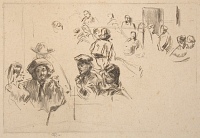Ratcliffe Highway | ||
| Number: | 65 | |
| Date: | 1859/1861 | |
| Medium: | drypoint | |
| Size: | 152 x 226 mm | |
| Signed: | no | |
| Inscribed: | no | |
| Set/Publication: | no | |
| No. of States: | 1 | |
| Known impressions: | 4 | |
| Catalogues: | K.80; M.81; T.63; W.74 | |
| Impressions taken from this plate (4) | ||
KEYWORD
dance-hall, man seated, interior, music, people, prostitutes, sailors.
TITLE
It has always born the title 'Ratcliffe Highway', in publications from 1874 on, with one exception, as shown below:
'Ratcliffe Highway' (1874, Ralph Thomas, Jr (1840-1876)). 1
'Heads. Sailor’s dance house' (1881, Union League Club). 2
'Ratcliffe Highway' (1909, Howard Mansfield (1849-1938)). 3
'Heads' could be confused with the title for other etchings, so 'Ratcliffe Highway' is the preferred title.
'Ratcliffe Highway' (1874, Ralph Thomas, Jr (1840-1876)). 1
'Heads. Sailor’s dance house' (1881, Union League Club). 2
'Ratcliffe Highway' (1909, Howard Mansfield (1849-1938)). 3
'Heads' could be confused with the title for other etchings, so 'Ratcliffe Highway' is the preferred title.
1: Thomas 1874 (cat. no. 63); Kennedy 1910 (cat. no. 80).
2: New York 1881 (cat. no 103).
3: Mansfield 1909 (cat. no. 81).
DESCRIPTION
The interior of a tavern or dance-hall, with some sixteen people roughly indicated. At front left a woman in profile, with dark straight hair, sits with a man wearing a broad-brimmed hat and smoking a long pipe, who faces front. He has a moustache and slightly bushy shoulder-length hair, and wears a light jacket and dark loose cravat. To right, again in the foreground, is a man, possibly Asian, wearing a cap and smoking a short pipe, and a woman with dark hair, leaning on his back. Both these figures face left towards the couple at left; all four may be leaning on a table or bar. Behind and to right are other figures, and some, in the background, may be musicians. An open door is visible at back right.
SITTERS
Wedmore described this as 'a sailors' dancing-house' although no-one is actually dancing, and commented: 'Two couples in the foreground. The sailors are probably foreigners; the women are of Shadwell.' 4 By this he means that the women were prostitutes. In 1857 there were far more brothels and prostitutes in the Ratcliffe and Shadwell areas than elsewhere in London according to 'A return of the number of Brothels and Prostitutes within the Metropolitan Police District' by William Acton. 5
4: Wedmore 1886 A (cat. no. 74).
5: 20 May 1857, in Acton, Prostitution, Considered in its Moral, Social and Sanitary Aspects, 2nd edition, 1870; in The Victorian Dictionary, ed. Lee Jackson, at http://www.victorianlondon.org (accessed 2008).
SITE
Thomas wrote that this was 'Etched at a sailor's dancing-house.' 6
Ratcliffe Highway, running from East Smithfield to Shadwell High Street, in the parish of Stepney in London, was a notoriously squalid slum, full of brothels, dance halls, gin-houses and seedy lodging houses. It was north of the waterfront in Wapping where Whistler worked at several etchings and paintings from 1859 on, such as Rotherhithe [70]. The area is described unfavourably by Watts Philips:
Ratcliffe Highway, running from East Smithfield to Shadwell High Street, in the parish of Stepney in London, was a notoriously squalid slum, full of brothels, dance halls, gin-houses and seedy lodging houses. It was north of the waterfront in Wapping where Whistler worked at several etchings and paintings from 1859 on, such as Rotherhithe [70]. The area is described unfavourably by Watts Philips:
6: Thomas 1874 (cat. no. 63).
'the head-quarters of unbridled vice and drunken violence- of all that is dirty, disorderly, and debased. ... all the shopkeepers have but one object, ... to attract the eye of the sailor, and inveigle him within their doors. ... Doctored porter and "jigger gin" will kill body and brain faster than arrack punch or sangaree; and though the sharks of Port Royal have keen eyes and sharp teeth, they are but novices in their trade compared to these - the sharks of Ratcliffe-highway!
... A dram-shop, rendered doubly attractive by sundry pictorial embellishments of sailors dancing horn-pipes - sailors carousing with their sweethearts; ... Beneath these cartoons are sundry announcements; such as "Grand Concert held here every evening, admission 2d." ... Round the door of this temple of harmony - which, despite the weather, is filling rapidly - are grouped sailors of all kinds, and women of but one; here are mariners from every part of the globe - ' 7
7: Watts Phillips, The Wild Tribes of London, 1855, quoted in http://www.victorianlondon.org ; see also Charles Dickens (Jr.), Dickens's Dictionary of London, 1879.
DISCUSSION
The male figure at front left is not unlike the artist himself, dressed in a broad-brimmed hat and pale linen suit similar to the style favoured by Whistler. It could well have been one of Whistler's friends, posing for the artist, rather than a chance-met acquaintance. Since he is staring straight at the artist, he must have known that Whistler was drawing him. Whistler would have been wise to have company in a Ratcliffe Highway tavern.
